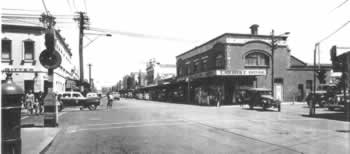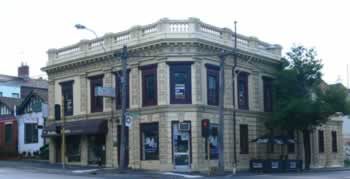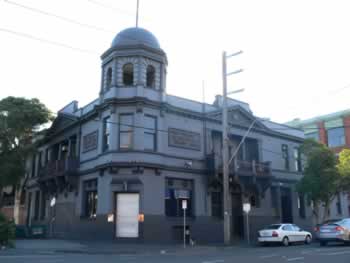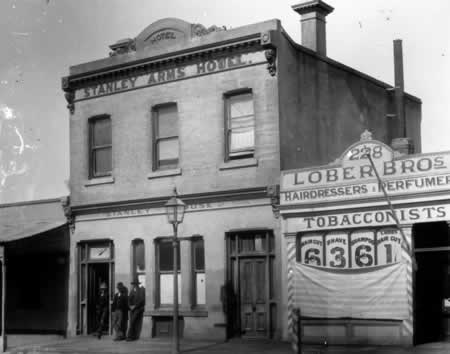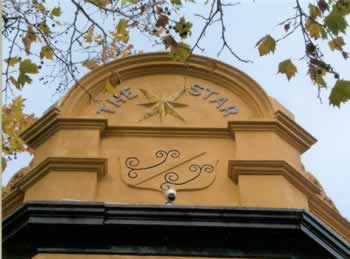Collingwood Hotels Database search
Use the fields below to search our Collingwood Hotels database. It contains all the hotels in the Collingwood, Clifton Hill and Abbotsford areas.
Hotel:Shakespeare Hotel
Suburb:Collingwood
[240 or 314] Wellington Street, between Perry and Johnston Street
Collingwood 3066
Australia
Map It
Shakespeare Hotel (1869 - 1870)
N/A
1869
1870
Presumed demolished
N/A
N/A
N/A
N/A
N/A
N/A
Kearney 1855: N ; Hodgkinson 1858: N ; MMBW: Not verified
Most of the buildings in this block were built later than 1870, but so far it has not been possible to identify exactly where the hotel was and which building replaced it.
Hotel:Sir Henry Loch Hotel
Suburb:Collingwood
Johnston St, southwest corner Hoddle Street
Collingwood 3066
Australia
Map It
Sir Henry Loch Hotel (1885 - 1971)
Weighbridge Hotel (1865 - 1884)
1865
1971
Demolished c.1971 for the widening of Hoddle Street
Rebuilt, date not known
N/A
N/A
N/A
N/A
N/A
Kearney 1855: N ; Hodgkinson 1858: N ; MMBW: Detail Plan 1197 & 1198, 1899
The original name of this hotel refers to the weighbridge that used to be on the other side of Johnston Street. Thomas Ransom was the first licensee, moving here from the Highbury Barn hotel at the other end of Hoddle Street. John Cooper was the licensee in the 1880s; Mrs John Cooper was granted permission to carry on the business for two months during her husband's absence in April 1881. The name change was a response to the appointment of Sir Henry Loch as Governor of Victoria in 1884.
The first hotel was built of wood, and replaced at an as yet unknown date.
Hotel:Sir John Franklin Hotel
Suburb:Collingwood
75a-77 Victoria Parade
Collingwood 3066
Australia
Map It
Sir John Franklin Hotel (1853 - 1925)
N/A
1853
1925
Restaurants
1880-90
N/A
N/A
Part C, pp. 635-636
Volume 3, Appendix B, individually listed within precinct
Individually significant within HO336
Kearney 1855: N ; Hodgkinson 1858: Y ; MMBW: Detail Plan 1208, 1899
The old stone hotel was replaced in the later nineteenth century by a richly ornamented Italianate style two-storey building which incorporated a shop. The building remains substantially intact as a distinctive nineteenth century facet of the character of Victoria Parade, although the stucco has been painted and some minor alterations made.
John and Elizabeth Davison were associated with the hotel from 1853. Mrs Davison took over as licensee in 1862 after her husband's death and remained in charge until 1899.
Sir John Franklin was a well-known explorer who was also Governor of Tasmania from 1836 to 1843.
Hotel:Sir Robert Peel Hotel
Suburb:Collingwood
125 Wellington Street
Collingwood 3066
Australia
Map It
Sir Robert Peel Hotel (1858 to present)
N/A
1857/58
N/A
Existing hotel
1911-12, 1926, and 1967
N/A
N/A
Part C, pp. 688, 693
Volume 2, Building Citations, Part II, pp. 407-408
HO 142, individually significant
Kearney 1855: N ; Hodgkinson 1858: Y ; MMBW: Detail Plan 1208, 1899
The original brick hotel was built in 1857. In 1858 the first licensee was John Thomas Wood, proprietor of the Yorkshire Brewery on the opposite side of Wellington Street. It must have been a substantial building, because its gross annual value as listed in the 1864 Collingwood municipal rate book was 250 pounds, equal to the Grace Darling and Mac's Hotel in Smith Street. Carlton Brewery bought the hotel in 1887; around 1911 it was demolished and replaced by the existing building, designed by Sydney Smith & Ogg. Some alterations were made in 1926, while extensive renovations took place in 1967, at which time the facade was painted. Some of the Peel Street windows have been filled in. It remains a good example of the Edwardian free classical revival style, but the details are unfortunately obscured by the external paintwork.
The name (and that of Peel Street) refers to the British statesman (Home Secretary 1822-1827, Prime Minister 1834-5 and 1841-46) who helped create the modern concept of the police force, giving rise to the terms 'bobbies' in England and 'peelers' in Ireland. He has given his name to at least a dozen pubs in the United Kingdom.
Hotel:Somerset Hotel
Suburb:Collingwood
96 Perry Street, northwest corner Campbell Street
Collingwood 3066
Australia
Map It
Somerset Hotel (1871 - 1925)
N/A
1871
1925
Demolished
N/A
N/A
N/A
N/A
N/A
N/A
Kearney 1855: N ; Hodgkinson 1858: N ; MMBW: Detail Plan 1197 & 1198, 1899
For a small street, Perry Street was well-served with pubs. The Wattle Tree was already operating in 1871 when the Somerset and the Ayrshire Arms opened within a short block of each other, while the Bell Inn closed in the same year.
Hotel:Stag's Head Hotel
Suburb:Collingwood
Rokeby Street
Collingwood 3066
Australia
Map It
Stag's Head Hotel (1854 - c1855)
N/A
1854
1855?
Presumed demolished
N/A
N/A
N/A
N/A
N/A
N/A
Kearney 1855: N ; Hodgkinson 1858: N ; MMBW: Not verifiable
Frederick Grundman was granted a licence for this hotel in 1854, but whether it ever operated or precisely where in Rokeby Street it was, is not known.
Hotel:Stanley Arms Hotel
Suburb:Collingwood
[230] Wellington Street, east side, opposite Stanley Street, between Vere and Singleton (formerly Little Smith) streets
Collingwood 3066
Australia
Map It
Stanley Arms Hotel (1867 - 1885)
N/A
1867
1885
Demolished
N/A
N/A
N/A
N/A
N/A
N/A
Kearney 1855: N ; Hodgkinson 1858: N ; MMBW: Detail Plan 1199 & 1200, 1899 ( building in between numbers 228 and 230)
At the Licensing meeting in January 1885 there was strong opposition to the renewal of a licence to the Stanley Arms Hotel. Petitions for and against the continuance of the hotel were read from the residents in the immediate vicinity, and a long time was spent in arguments, many witnesses giving evidence against or in favour of the hotel. The application for a licence to the current landlady, Mrs Hollingsworth, was refused, and application was then made for a licence to a Miss Maher. This, too, was opposed on the grounds that the hotel was not required, and the application was adjourned for a month. ( The Argus 21 January 1885, p. 9). A further application was made in December, but was again refused.
A photo taken in the early 1890s shows a simply-decorated symmetrical two storey building looking much as it would have done when it was operating, even to a few loungers standing about outside. The word hotel has been painted over with 'house'.
Hotel:Star Hotel
Suburb:Collingwood
9-11 Peel Street, southeast corner Little Oxford Street
Collingwood 3066
Australia
Map It
Star Hotel (1868 - 1925)
N/A
1868
1925
Had been for sale and/or unused since the demise of the Trade Bar, but is undergoing renovation in 2011 and will soon open as a bar.
N/A
N/A
N/A
Part B, pp. 449-450
N/A
Individually significant within HO 318
Kearney 1855: N ; Hodgkinson 1858: N ; MMBW: Detail Plan 1208, 1899
Built by Thomas Veal who had previously owned a house on the site with a timber shop adjoining, the first licensee was James Massie, who soon left to run his own hotel (Massie's) in Wellington Street. There were frequent changes of licensees, with the longest stretch being that of owner Mrs Mary Maher, who after the death of her husband Thomas in 1878 took on the day-to-day business. In 1887 architect Harry B Gibbs supervised the replacement of the shop with the present brick structure, as well as alterations to the hotel. Mrs Maher handed over the reins to another publican in 1889, but continued as owner well into the twentieth century.
Around 1890 the Star became the home of the Loyal Lincoln Lodge of the I.O.O.F. At a meeting held in 1891, after business was completed 'members and visitors indulged in a little relaxation in the form of harmony... in which many gave their services to make the rest merry [by] the musical portion of the evening.' ( The Argus, 5 February 1891, p. 3)
After delicensing, the hotel was used for residential purposes. In the 1930s it accommodated unemployed men, and indeed was mentioned in a slum investigation report as the overcrowded residence of 56 such men. After being divided into apartments in the late 1960s, the building was rescued from oblivion when it housed Iain Hewitson and Sigmund Jorgensen's Clichy Restaurant from 1977. Later, Jock's Bar flourished briefly, followed around 2002 by the Gay Trade Bar, which closed about 2007.
The Star is a very attractive corner building, which incorporates various architectural references to its name in the exterior decoration. The window frames have unusual detailing, and the shop window is substantially intact, although the verandah has been removed. The buildings contribute to Peel Street which retains, among ugly modern factories, a number of Victorian buildings with unusually intact exteriors.
Hotel:Stirling Castle Hotel -
Suburb:Collingwood
Smith Street, somewhere in between 98 and 108
Collingwood 3066
Australia
Map It
Stirling Castle Hotel (1853 - c.1870)
N/A
1853
1869/70
Demolished 1870s?
N/A
N/A
N/A
N/A
N/A
Current buildings on site contributory to HO333
Kearney 1855: Y ; Hodgkinson 1858: Y ; MMBW: N/A
This was described as a stone building in the 1864 rate book, and as plaster in the 1867 rate book, probably meaning the bluestone had been rendered. During its lifetime, this hotel had 12 publicans, most only staying for a year. In its final year of operation, the publican was J Blake, who the following year was a wine merchant, possibly in the same building. In the late 1860s there were still a number of the older timber buildings in Smith Street, but with growing prosperity and the increasing commercial importance of the street, which was overtaking Wellington Street in popularity, owners were replacing these with more substantial brick. In 1869 Charles Brown owned the hotel and one wooden shop; by 1874 he owned four shops, which were probably the group of four two-storey shops currently numbered 100 to 106. The site of the hotel was therefore probably somewhere on the land now covered by these shops.
Hotel:Studley Arms Hotel
Suburb:Collingwood
[274, later 252] Wellington Street, northeast corner Little Bedford Street
Collingwood 3066
Australia
Map It
Studley Arms Hotel (1850 - 1908)
N/A
1850/51
1908
Demolished c.1968
Enlarged in 1852 to accommodate the influx of gold immigrants
N/A
N/A
N/A
N/A
N/A
Kearney 1855: Y ; Hodgkinson 1858: Y ; MMBW: Detail Plan 1197 & 1198, 1899
Peter Petherick, Collingwood rate collector and sometime councillor, owned and occupied the two-storey bluestone hotel from about 1861 until his death in 1877. According to his son Edward, the Studley originally belonged to Alderman John Hodgson and was the most substantial hotel in the district; it was originally planned as three shops, one of which was afterwards used for municipal offices and the Court of Petty Sessions until purpose-built structures were erected in Johnston Street in 1859.
In 1862 an anonymous letter in the Collingwood Observer remarked of Councillor Petherick: 'Being chairman of the public works committee what more natural than that contractors and their men should flock to the bar of the Studley Arms where the landlord can dispense nobblers and patronage at the same time'.
In 1863 the first large public meeting of the Labour, Protection and Tariff Reform League was held at the Studley Arms. Collingwood was at the forefront of the Victorian protectionist movement, supported by Graham Berry's Observer. Petherick's daughter Rosa conducted a private school in the hotel in the 1870s (perhaps in the room formerly used for council meetings).
By 1900 the hotel was owned by the Castlemaine Brewing Company. After closure, the building became a laundry, then Cockatoo Preserves Pty Ltd and eventually spent many years as a cardboard box factory, first operated by the Austral Box Manufacturing Company, and later Wood and Carson Pty Ltd. By January 1964 its bluestone walls were still looking very solid, but with its lower storey windows altered and doors replaced it had an uninviting air, hard to imagine as the centre of conviviality and political intrigue that it once was. All the buildings in the block of Wellington Street bounded by Vere and Perry Streets were demolished 1968/1969 for the building of Housing Commission high rise flats.

